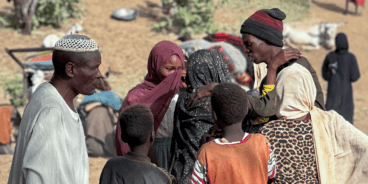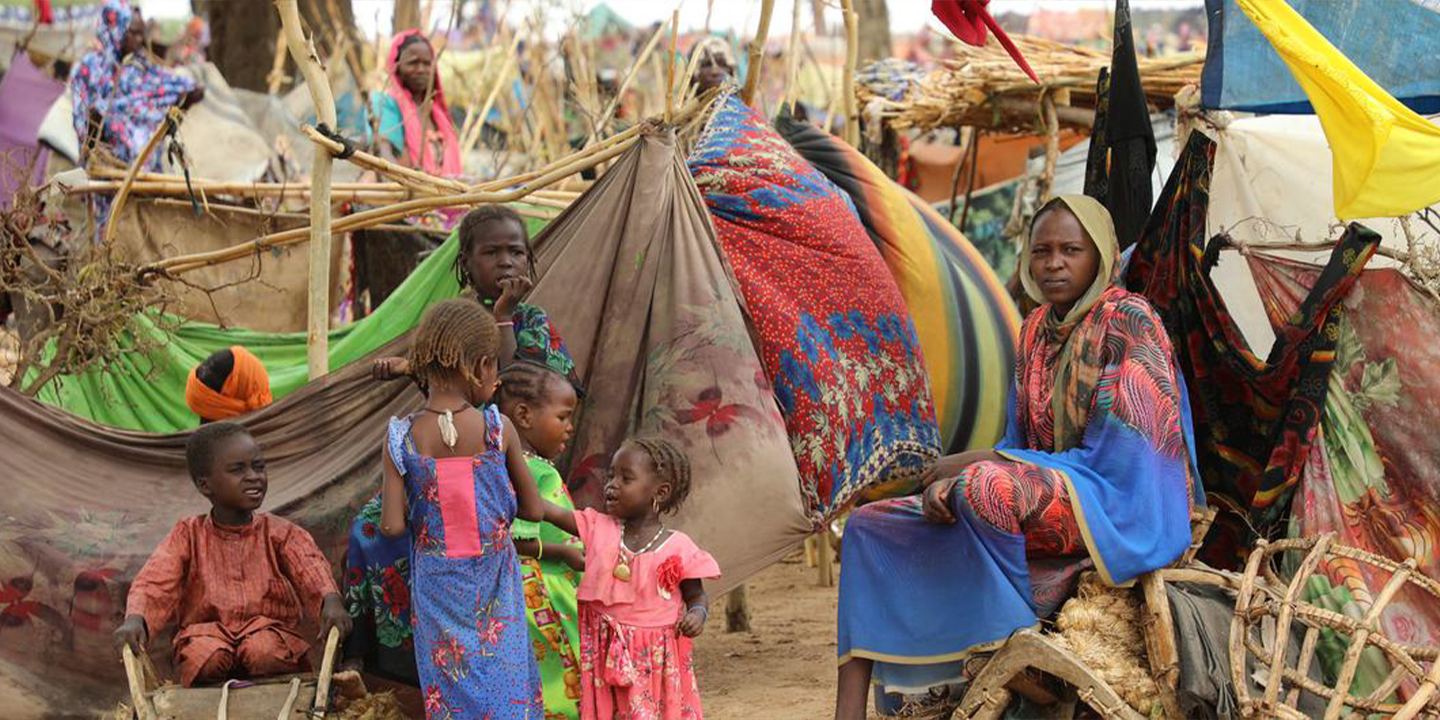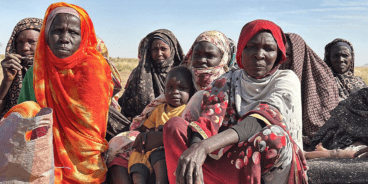

Atrocity Alert No. 373: Sudan, Israel and the Occupied Palestinian Territory and Ukraine
Atrocity Alert is a weekly publication by the Global Centre for the Responsibility to Protect highlighting situations where populations are at risk of, or are enduring, mass atrocity crimes.
AT LEAST 1,300 KILLED IN MASS ETHNIC KILLINGS IN ARDAMATA, WEST DARFUR
Last week videos and reports circulated on social media describing potential atrocity crimes perpetrated by the Rapid Support Forces (RSF) against civilians based on their ethnic identity in Ardamata, an outlying district in El Geneina, West Darfur, during the first week of November. According to local monitors, at least 1,300 people were killed and 2,000 injured in attacks between 4 to 6 November. Two days after seizing control over the military base in El Geneina on 4 November, the RSF reportedly went door-to-door and raided and plundered houses and shelters, rounded up and killed members of the non-Arab Massalit community and arbitrarily detained civilians. Six community leaders and their families were among those killed during the attacks.
Since April populations in Darfur have experienced large-scale attacks by the RSF as part of a systematic campaign aimed at preserving and expanding their control, while also allegedly ethnically cleansing the area of non-Arab communities. More than 29 cities, towns and villages have been fully or partially destroyed and mass graves have previously been identified in El Geneina and Misterei.
There is now an imminent risk of atrocities in El Fasher – the last city in Darfur not yet under RSF control – where violence has intensified in recent days. In the last few months thousands of civilians from other parts of Darfur have sought refuge in and around El Fasher. On 14 November the UN Special Adviser on the Prevention of Genocide, Alice Nderitu, warned that the “current dynamics in the region could lead to further mass killings in an environment of complete lawlessness and impunity. The risks of genocide and related atrocity crimes in the region remain grimly high.”
The targeting of civilians based on ethnicity is not a new pattern in Darfur. For decades, the Arab-dominated government imposed its control on ethnic minorities and exploited ethnic divisions, resulting in competition and deadly conflicts over shrinking resources and pastoral land. Civilians are at continued risk of ethnic cleansing and genocide given the region’s genocidal history, entrenched impunity and the ethnically charged nature of the current violence.
While the international community should continue to support efforts aimed at ending the fighting between the Sudanese Armed Forces and RSF in Khartoum and elsewhere, it must urgently respond to the risk of further atrocities perpetrated against communities in Darfur. During tomorrow’s briefing on Sudan, the UN Security Council (UNSC) must condemn the atrocities perpetrated by the RSF and express alarm about the atrocity risks facing non-Arab communities in Darfur, as well as consider expanding the existing sanctions regime. The UNSC should also exert maximum pressure on the warring parties and identify ways to expand the mandate of the UN mission in Sudan to include civilian protection tasks.
HOSPITALS IN GAZA DEVASTATED BY BOMBARDMENTS AND HOSTILITIES
Amidst the ongoing Israeli military offensive in Gaza, hostilities and targeted attacks on hospitals and other medical facilities have intensified in recent weeks, further devastating the already severely strained healthcare system. Recurrent bombing and clashes, as well as direct raids by Israeli forces around Gaza’s largest hospital, Al-Shifa, have damaged critical health infrastructure. Hundreds – or possibly thousands – of people remain trapped inside as many patients are unable to walk and require special procedures for evacuation. Other hospitals are similarly impacted across northern Gaza, where a recent evacuation attempt by the International Committee of the Red Cross at Al Quds Hospital failed due to intense hostilities.
While the Israeli military alleges that Hamas has operation centers under Al-Shifa, medical professionals and hospital management staff have denied this claim and called for an independent investigation. Human Rights Watch asserts in a new report that no evidence put forward would justify depriving hospitals and ambulances of their protected status under International Humanitarian Law (IHL) and Israel’s repeated attacks on medical facilities, personnel and transport should be investigated as war crimes. Under IHL, medical facilities and personnel cannot be used to shield military objectives and any operation around hospitals must take steps to protect patients, staff and other civilians. Additionally, evacuation warnings must consider physical abilities to do so safely.
Israel’s ongoing siege of Gaza has significantly impacted hospitals, which have run out of essential medicines and basic equipment. Since 11 October, Gaza has had no electricity or flow of fuel, which are critical for operating hospitals. After weeks of warning that hospitals are on the brink of collapse, on 13 November the health ministry in Gaza announced that all hospitals in northern Gaza, except for Al-Ahli Hospital, have stopped functioning. Dozens of patients at Al-Shifa, including premature babies, have reportedly died as the hospital has had no power for days. Rescue teams and ambulances are struggling to reach civilians and those that do have nowhere to take the injured.
Director General of the World Health Organization (WHO), Tedros Adhanom Ghebreyesus, said, “The world cannot stand silent while hospitals, which should be safe havens, are transformed into scenes of death, devastation and despair.” As of 12 November, at least 521 people, including 16 medical workers, have been killed in 137 attacks on health care, according to WHO. Airstrikes in the last week have also hit the Swedish clinic in Ash Shati camp, Al Mahdi Hospital and Jabalia refugee camp.
All hostilities, including the disproportionate bombardment of Gaza, must cease immediately to bring catastrophic human suffering to a halt. Israel should urgently end the blockade of the Gaza Strip to restore the flow of electricity, fuel and water. All relevant parties must guarantee safe and unimpeded access for humanitarian aid.
THOUSANDS OF UKRAINIAN SCHOOLS DAMAGED AND DESTROYED SINCE FEBRUARY 2022
On 9 November Human Rights Watch released a new report on the destruction of schools and education facilities in Ukraine since Russia’s full-scale invasion in February 2022. According to the Ukrainian government, 3,790 educational facilities have been damaged or destroyed during the conflict, interrupting the education of millions of children. The report determined that most of the damage to schools was due to air and rocket strikes, shelling and the use of cluster munitions.
During their occupation of certain areas, Russian forces frequently looted and pillaged education facilities, including taking or destroying computers, televisions, interactive whiteboards and other school equipment. Russian forces also often occupied schools, both firing from them and using them as a base for holding civilians and prisoners of war. After Ukrainian forces regained territorial control, they would often find burned out and ransacked classrooms, sometimes with graffiti that expressed hate toward Ukrainians. In one incident, Russian soldiers occupied a school near the Ukrainian capital of Kyiv and painted anti-Ukrainian graffiti on the walls and left a flag with a Nazi swastika hanging. The school was also badly damaged by Ukrainian return fire. The use of schools for military purposes is banned under international law and may amount to a war crime.
The systematic destruction of schools has forced many children to learn virtually. However, repeated attacks by Russian forces on civilian infrastructure, including power infrastructure, causes electricity and internet outages and inhibits access to remote learning.
Attacks on infrastructure are increasingly concerning ahead of the colder winter months, as risks to civilians heighten due to the lack of power, heat and running water. During a visit to Kherson on 13 November, the Secretary General of the Norwegian Refugee Council, Jan Egeland, stressed, “Millions of families are facing a growing winter nightmare… People have told me about the horror of watching their communities transformed into sites of destruction or battlegrounds.” Egeland said that after 600 days of war, relentless hostilities and constant bombardment still plague communities on the frontline. That same day, Russian shelling killed three civilians and injured 12 others, including a two-month-old.
While Ukraine has taken steps to protect schools during the conflict, including the adoption of an action plan to implement the requirements within the Safe Schools Declaration, as well as training over 1,000 military officials in the Declaration, schools and other protected sites remain at risk due to near-daily bombardments by Russian forces. The international community should continue to support Ukraine in protecting civilian infrastructure in line with international law.
Related Content


Joint Statement: Genocide Returns to Darfur
